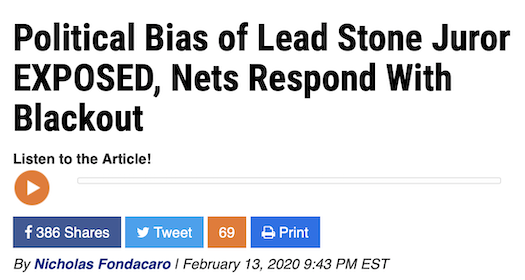For an operation that tends to pride itself on being in the respectable part of the conservative spectrum, the Media Research Center sure felt the need to glom onto a conspiracy theory involving a friend of President Trump. Nicholas Fondacaro rants to set the scene in a Feb. 13 post:
Tameka Hart, the forewoman in the federal trial against Roger Stone, was exposed on Wednesday by Daily Caller investigative reporter Chuck Ross for once being a Democratic candidate for Congress, on top of being a staunch anti-Trump opponent. While the story continued to spread online, the liberal broadcast networks (ABC, CBS, and NBC) tried to hide the revelation from their viewers.
On Thursday, the networks continued to insist (via obsession) that the only controversy with the case was Attorney General William Barr requesting a shorter incarceration period than what prosecutors were demanding.
A simple review of Hart’s Twitter account proves how politically motivated she was by far-left politics.
Jeffrey Lord followed two days later complaining that Hart is “a far left wing activist” and whining: “A biased, left-wing activist, anti-Trump, anti-Stone juror on the Stone jury? Ho-hum. Nothing to report here, move along.” Fondacaro then repeated his complaint that “the lead juror in the Stone trial had a long history of anti-Trump statements and had once run for Congress as a Democrat.”
Needless to say, Fondacaro and Lord will never concede that the Hart story isn’t really a story at all. Why? Because Hart did not hide her history during jury selection. As an actual news organization reported:
[T]he juror’s identity was always known to both Stone’s defense and prosecutors throughout pretrial proceedings, and she disclosed her background, including a Democratic bid for Congress, in public pretrial jury selection proceedings.Stone’s defense and his trial judge had the opportunity to question Hart directly and challenge her eligibility.
Potential jurors were also asked if they, any close friend or family member had ever run for or held federal, state or local office, and if they had formed any opinion about Trump or Clinton, or if their possible connection in the case “would make it difficult for you to be fair and impartial to both sides?”
[…]It is not known how Hart answered the social media question, or whether she had commented publicly on Stone. But Hart, in jury screening observed by the public, said she had not formed an opinion about Stone, and was seated after both sides had a chance to press her. Hart’s identity was apparent to observers, but court rules forbid naming jurors publicly.
The Supreme Court standard for juror qualification is that they need not “be totally ignorant of the facts and issues involved … It is sufficient if the juror can lay aside his impression or opinion and render a verdict based on the evidence presented in court.”
According to a court ruling released Wednesday, Stone’s defense did move, unsuccessfully, to seek a new trial alleging bias by another juror, but not Hart.
And Fondacaro and Lord are certainly not going to tell you that another juror in the Stone case defended Hart as “perhaps the strongest advocate in the room for a rigorous process, for the rights of the defendant and for making sure that we took it seriously and looked at each charge,” adding: “”Without her in the room, we would have returned the same verdict, and we would have returned it more quickly and without looking as deeply into the evidence. … I’m firmly convinced of that.”
Yes, there is that inconvenient fact that all 12 jurors agreed to convict Stone of the charges against him.
But then, neither Fondacaro nor Lord actually want impartiality here — they want bias, just not the kind they’re accusing Hart of. Because Stone is a friend of Trump, and the MRC exists today has a Trump protector, that means Stone must similarly not be held accountable for his behavior, and that everyone else, not them, has a biased agenda.
